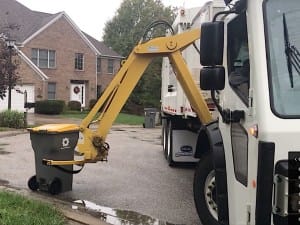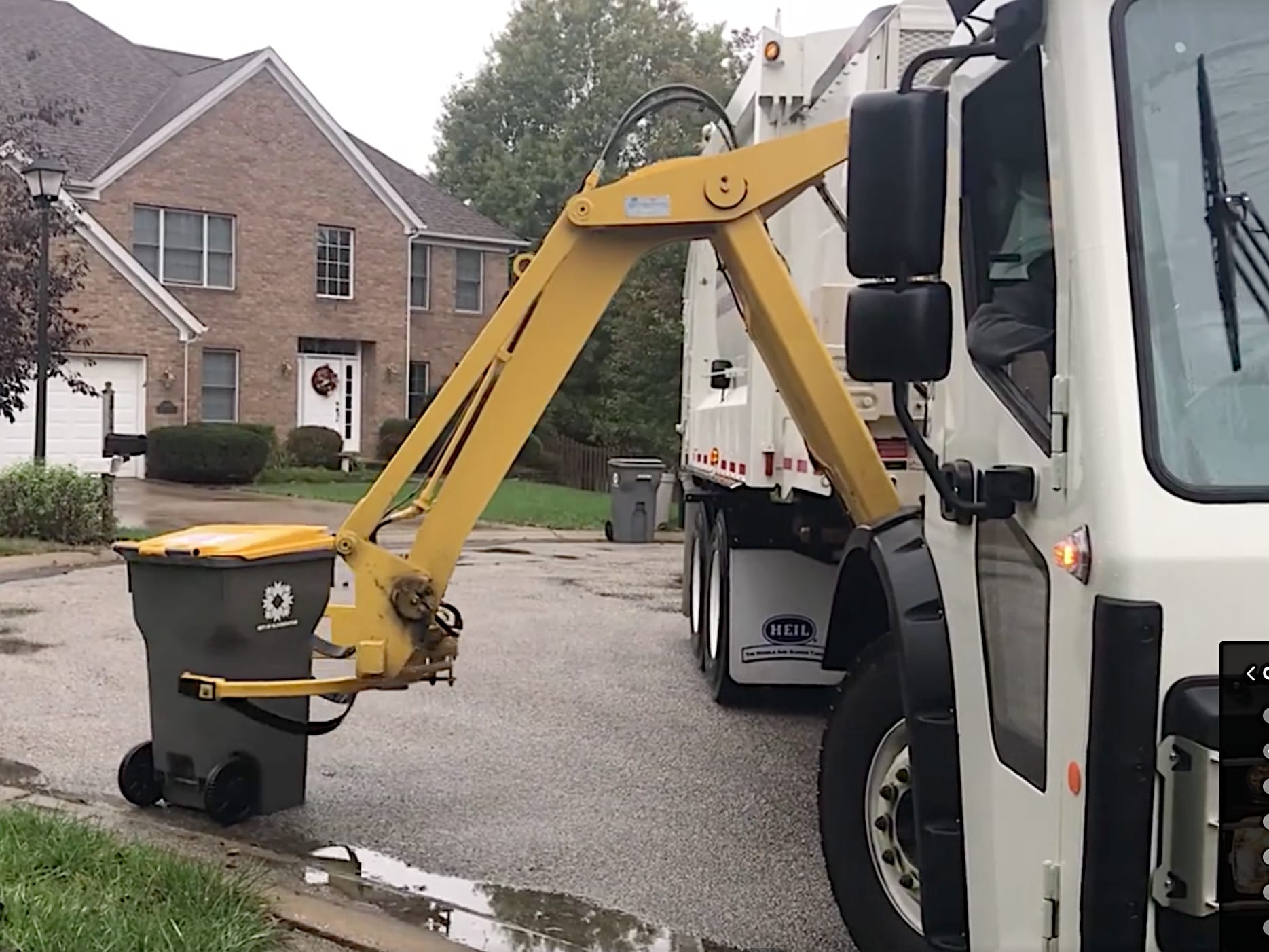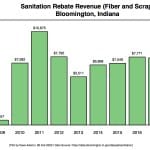Trash cart rate increase makes public works director think about the future of recycling: “Bloomington is a community that is known to be entrepreneurial…”




Starting in the April billing cycle, Bloomington residents will pay more every month for trash and recycling service. That’s the result of a unanimous vote on the three-member board of public works at its regular meeting on Tuesday.
In round numbers, customers will pay between $3.50 and $23 more a year, depending on the size of the trash cart they use.
The fee increase is due to costs that are charged to the city by Republic Services for processing recycled materials. Those costs have replaced payments the city previously received (“rebates”) for its recycling commodities, according to Bloomington’s director of public works, Adam Wason.
Also at Tuesday’s meeting, Wason spitballed a possible new way of paving local streets.
The two topics—recycling pickup charges and road resurfacing—are related. How?
In light of the upheaval on the international recycling commodities market, Wason said Bloomington needs to start thinking of ways to try to localize the recycling commodities market.
Wason described the recycling-and-roads connection this way: “I have a grand dream that someday we’ll be the first community in Indiana with a glassphalt street, or asphalt with plastic aggregate in it.” Glassphalt is a kind of asphalt that incorporates crushed glass into the mix.
Responding to a question on Tuesday from board member Beth Hollingsworth, Wason confirmed that Bloomington’s waste processor still allows Bloomington to include glass in its recycling stream.
But starting in December, Wason said, Republic told the city of Bloomington that plastic foam—one of the #7 plastics—would no longer be accepted. And Wason reported that he’d learned in phone call to Republic earlier on Tuesday that film plastics, like those in grocery bags, would also no longer be accepted.
Before Tuesday’s meeting, Wason told The Square Beacon that the department of sanitation has sent letters to all households using the waste collection service alerting them to the ban on plastic foam, called “styrofoam” in casual usage. But customers are still putting the material in their recycling bins.
The next educational step, Wason told The Square Beacon, will be to place new stickers on the lids of the roughly 14,000 recycling carts in service throughout the city. The stickers will say that only plastics #1-5 are accepted and that plastic foam is not allowed.
The increase approved by the board of public works on Tuesday put the cart fees at the maximum in the range specified in the the ordinance enacted by the city council in 2017, which converted the old “sticker” system to a cart-based system.
| Cart Size | New Rate |
Old Rate |
Pct Increase |
Yearly Increase |
| 35 Gallon | $6.51 | $6.22 | 4.66% | $3.48 |
| 64 Gallon | $11.61 | $10.52 | 10.36% | $13.08 |
| 96 Gallon | $18.52 | $16.60 | 11.57% | $23.04 |
Even with the rate increase, the city will not be able to recover the costs of processing recycled materials. Wason told The Square Beacon there is no immediate plan to ask the city council to consider a change to local law to increase the rate that can be charged for carts.
Wason told the board that in 2019 Bloomington collected about 3,200 tons of recyclables at total cost of about $85,600—that’s based on a per-ton rate of $26.40. It’s still less than the $43 per ton for landfilling specified in the city’s contract with Republic.
When Bloomington switched to single-stream recycling back in late 2017, Wason said, the recycling market was pretty steady. In the nine to 12 months that followed, the international commodities market saw considerable upheaval, Wason said.
Instead of asking the city council for a trash cart rate increase, Wason said, he will more likely ask the council to consider giving the sanitation department the ability to fine non-compliant customers. He hopes that might help keep Bloomington’s recyclables in as “clean” as state as possible. That means no plastic foam and no plastic grocery bags.
Keeping the recycling stream clean puts the city in a better position to negotiate rates when the contract with Republic expires at the end of 2021.
Wason said that the sanitation division does not have the ability under current fee structures to issue a $5, $10 or $15 fine if the recycling cart is contaminated with prohibited material. In addition to plastics, greasy pizza boxes are a frequent source of contamination, Wason said.
It would also be useful be be able to issue a fine, Wason said, if a cart lid is left open—which lets them fill up with water when it rains and doesn’t keep the material in the cart as the mechanical arm empties it into the truck.
The issue could be a test of the city council’s new set of standing committees, which were enacted on a 5–4 split vote. The four members the utilities and sanitation committee are: Matt Flaherty, Dave Rollo, Kate Rosenbarger, Jim Sims. That committee could choose to start meeting to study the topic of fines for cart infractions, or broader revisions to the recycling program, even without a referral of legislation by the council.
The change in the global recycling market means Bloomington needs to start thinking hard about its recycling program, Wason said. “We really need to start thinking about what the future recycling is going to be.” He added, “Right now we’re planning to continue with single-stream recycling throughout 2020 and 2021, but we’ll be looking at what options exist. What should we be really focussing our recycling efforts on?”
The idea of paving roads with recycled glass is one potential idea for localizing those market for recycled commodities. But Wason said Bloomington is not yet positioned to execute that kind of idea.
“We’re not there yet. We have to find some willing partners. But Bloomington is a community that is known to be entrepreneurial in their thought and I think we really need to think about that with recycling,” Wason said.




Comments ()